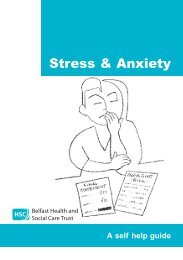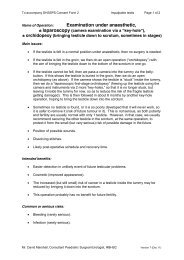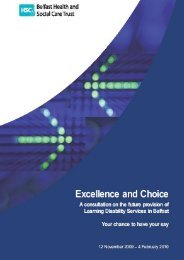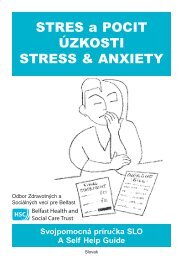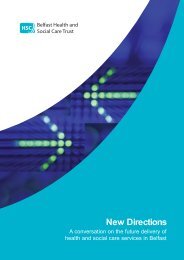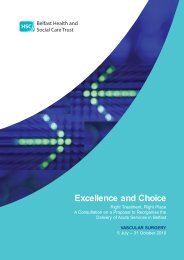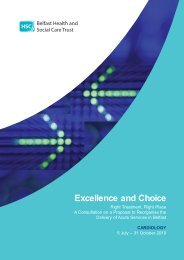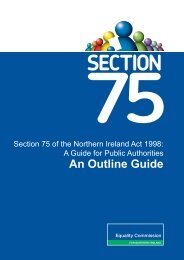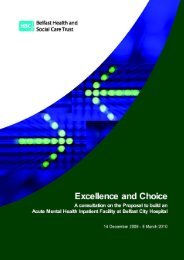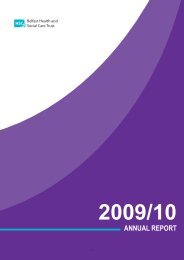NEW DIRECTIONS - Belfast Health and Social Care Trust
NEW DIRECTIONS - Belfast Health and Social Care Trust
NEW DIRECTIONS - Belfast Health and Social Care Trust
- No tags were found...
You also want an ePaper? Increase the reach of your titles
YUMPU automatically turns print PDFs into web optimized ePapers that Google loves.
New DirectionsA conversation on the future delivery ofhealth <strong>and</strong> social care services in <strong>Belfast</strong>Response to Consultation Process <strong>and</strong> the way forwardNovember 2008
ContentsPage NoAcknowledgement 3Section 1: Overview of New Directions Document 4Section 2: Consultation Process 6Section 3: Summary of Responses Received <strong>and</strong> 10Consequent <strong>Trust</strong> ActionsSection 4: Recommendations <strong>and</strong> Next Steps 21Appendix 1: Details of written responses 242
Acknowledgement<strong>Belfast</strong> <strong>Health</strong> <strong>and</strong> <strong>Social</strong> <strong>Care</strong> <strong>Trust</strong> extends its thanks to the manyindividuals <strong>and</strong> organisations who provided a written response to the NewDirections document <strong>and</strong> / or who attended a consultation meeting.3
Section 1Overview of New Directions DocumentNew Directions is the first overview of the strategic direction for services forthe <strong>Belfast</strong> <strong>Trust</strong>. The ideas within the paper represent an initial direction oftravel for the way services will be provided in the future. It is important to notethat each key proposal for change will be consulted upon further – towhatever extent is necessary, in keeping with the <strong>Trust</strong>‟s commitment toconsult with staff, service users <strong>and</strong> the public at large.The approach to reviewing <strong>and</strong> reorganising the services of the <strong>Trust</strong> hasbeen guided by some general principles:Improve health <strong>and</strong> wellbeing <strong>and</strong> reduce health inequalities;Focus on prevention of illness, early assessment <strong>and</strong> intervention;Focus on individual needs <strong>and</strong> choices;Provide safe, high quality, effective care;Improve accessibility to services – promote equity <strong>and</strong> welcome diversity;Localise where possible, centralise where necessary;Integrate services (through partnership working);Provide clear directions to services, reducing fragmented <strong>and</strong> frustratingservices; <strong>and</strong>Maximise utilisation of assets.New Directions guided the reader through the complex range of <strong>Trust</strong>services by asking questions that follow the stages of life when a person mayneed to access <strong>Health</strong> <strong>and</strong> <strong>Social</strong> <strong>Care</strong> Services from <strong>Belfast</strong> <strong>Trust</strong>. Thequestions were as follows:How do I get access to Community <strong>Health</strong> <strong>and</strong> <strong>Social</strong> <strong>Care</strong> Services <strong>and</strong>be informed about the services that are available to me?Where do I go if I am having a baby?Where do I go if I need to access services for children?Where do I go if I need support or care because of my physical or sensorydisability?Where do I go if I need support because I have a learning disability?Where do I go if I am an adult <strong>and</strong> need mental health services or I havean acute mental illness?Where do I go if I need acute hospital services (that is, emergencyservices, planned care <strong>and</strong> long term chronic condition management)?Where do I go if I need support because I am an older person?4
For each of these stages of life the <strong>Trust</strong> described the principles guiding howservices are provided <strong>and</strong> described the model of care favoured by the <strong>Trust</strong>.We then asked that the following questions were considered:Do you agree with the principles outlined?Do you have any suggested additions to these principles?Do you agree with the <strong>Trust</strong>‟s favoured model of care?The <strong>Trust</strong> has now completed a consultation on the initial direction of travel forfuture service provision.This paper provides information on the responses received to the questionsabove.5
Section 2The Consultation ProcessNew Directions was the beginning of a conversation between <strong>Belfast</strong> <strong>Trust</strong><strong>and</strong> the citizens we serve on how we should deliver services in a faster, moreflexible, less bureaucratic <strong>and</strong> more effective way.The consultation period began on 29 August <strong>and</strong> closed on 7 November2008.Details of consultations undertaken are as follows:2.1 Pre consultationThe <strong>Trust</strong> embarked on a pre-consultation exercise in order to consultwith a wide range of interested parties about the content of the NewDirections document:20 May 08 at the launch of Involving You: a framework for communitydevelopment <strong>and</strong> user involvement a presentation was delivered onNew Directions to 200 representatives from community groups,carers, charities, patient advocates, <strong>and</strong> voluntary organisations;August 08, the Chief Executive <strong>and</strong> the Director of Planning <strong>and</strong>Redevelopment met with a wide range of political parties <strong>and</strong>Members of the Legislative Assembly;August 08 the Chief Executive <strong>and</strong> the Director of Planning <strong>and</strong>Redevelopment met with media key representatives; <strong>and</strong>5 August 08, the Chief Executive <strong>and</strong> Director of Planning <strong>and</strong>Redevelopment presented to the <strong>Trust</strong> Advisory panel. This group ismade up of service users, carers, patient, community, voluntary <strong>and</strong>statutory representatives.2.2 Formal consultationNew Directions paper was presented to the <strong>Trust</strong> Board at a publicmeeting on 28 August 08. The formal consultation process ran from29 August – 7 November 08; <strong>and</strong>New Directions was sent to 2509 service users <strong>and</strong> key stakeholdersensuring that the <strong>Trust</strong> consulted as widely as possible. Abreakdown of the stakeholders is outlined in Table 1 overleaf.6
Table 1: Numbers of Consultation Documents Distributed, by keyservice user <strong>and</strong> stakeholder groupGroupingNumber in Group<strong>Belfast</strong> <strong>Trust</strong> Non-Executives 7<strong>Belfast</strong> <strong>Trust</strong> Staff 250Chairperson of <strong>Belfast</strong> <strong>Trust</strong> Medical Staff 5Chief Executives <strong>and</strong> Chairpersons of other <strong>Trust</strong>s<strong>and</strong> Boards 9Community database 1440Castlereagh Borough Council Members 23<strong>Belfast</strong> City Council Members 52NI Assembly Members 107DHSSPS Senior Staff 17GP practices – NI* 293GPs North <strong>and</strong> West <strong>Belfast</strong>* 44GPs South <strong>and</strong> East <strong>Belfast</strong>* 44Local Commissioning Groups 6Partnership Boards 5Patient <strong>and</strong> Client Councils 5Staffside 29Service Group additional stakeholdersSpecialist ServicesHead & SkeletalMental <strong>Health</strong>Medical Director 168Miscellaneous 5Total 25097
* - New Directions was sent to practice managers for distribution to GPs intheir practiceA <strong>Belfast</strong> <strong>Trust</strong> press release announced the formal consultationprocess on 2 September 2008; Articles on New Directions appeared on the <strong>Trust</strong> intranet (2September 2008) <strong>and</strong> the internet dated (3 September 2008);Articles outlining the content of the document were published in the<strong>Belfast</strong> Telegraph, Irish News <strong>and</strong> News Letter on 3 September 2008;The Chief Executive was interviewed on Good Morning Ulster <strong>and</strong> theStephen Nolan Show on 3 September 2008. He also wasinterviewed on UTV that evening.The Chief Executive <strong>and</strong>/or Director of Planning <strong>and</strong> Redevelopmentpresented New Directions at a range of public events during September,October <strong>and</strong> November as outlined in Table 2 below. Most sessionslasted approximately 2 hours.Table 2: PresentationsOrganisationsNumber attending Meeting(approximately)<strong>Belfast</strong> <strong>Trust</strong> <strong>Care</strong>rs Forum 23Black <strong>and</strong> Minority Ethnic Forum 5Disability Action 2East <strong>Belfast</strong> Community Development Agency 16East <strong>Belfast</strong> Partnership Board 13Eastern <strong>Health</strong> <strong>and</strong> <strong>Social</strong> Services Council 10Engage with Age 59GP Briefing – North <strong>and</strong> West 110GP Briefing – South <strong>and</strong> East 65Long Term Conditions Alliance 25Mater Medical Staff Committee 20North <strong>Belfast</strong> Partnership Board 16Shankill Partnership Board 9South <strong>Belfast</strong> Partnership Board 15VSB/ North <strong>and</strong> West Older People Fora 42West <strong>Belfast</strong> Partnership Board 398
In total 70 written responses to the document were received from users,carers, <strong>Trust</strong> staff, voluntary groups, charities, partnership organisations,statutory bodies <strong>and</strong> other interested stakeholders. Further details of thosewho provided a written response can be found in Table 3 below <strong>and</strong> also inAppendix 1.Table 3: Written responsesSectorNumbers of ResponsesReceivedIndividuals 3Staff Side 2Partnership Boards 2Statutory Organisations 5Staff 12Voluntary, Community, Charitable <strong>and</strong> IndependentOrganisations17Neurology 26Others 39
Section 3Summary of responses received <strong>and</strong> consequent <strong>Trust</strong>actionsThis section of the document addresses the feedback the <strong>Trust</strong> received inrelation to the specific questions asked regarding guiding principles, servicespecific questions <strong>and</strong> models of care. The responses are summarised toreflect the views <strong>and</strong> themes of the comments received.It is important to note that many of the responses contained questions orcomments that related to specific changes for individual services. Thepurpose of the New Directions document was to consult on the initial directionof travel for the way services will be provided in the future. It would neverhave been possible for the <strong>Trust</strong> to cover specific service changes in thisdocument, given the vast array of services provided by the <strong>Trust</strong>.The <strong>Trust</strong> is committed to further consultation <strong>and</strong> engagement on keyproposals for change (as a separate exercise) – to whatever extentnecessary, in keeping with the <strong>Trust</strong>‟s commitment to consult with staff,service users <strong>and</strong> the public at large.3.1 Question 1 - Guiding Principles3.1.1 The <strong>Trust</strong> is seeking your views on the principles outlined toguide the modernisation <strong>and</strong> reform of services across <strong>Belfast</strong>.Do you have any comments or suggested additions to the generalprinciples outlined?There was overall agreement with the guiding principles. There were anumber of specific points which we will take forward as a consequenceof the consultation.The <strong>Trust</strong> recognises that carers form an integral part of our service.This will be reflected <strong>and</strong> formally acknowledged within New Directions.A guiding principle in New Directions is a focus on individual needs<strong>and</strong> choices. This encompasses all aspects of care to ensure aholistic approach to service provision. Inherent to this approach is theprovision of psycho-social care.All services the <strong>Trust</strong> provides are developed <strong>and</strong> delivered on anevidence based approach.There was absolute support for the <strong>Trust</strong> to address healthinequalities <strong>and</strong> to use its resources in a targeted manner to achievethis goal. It was also acknowledged that the wider determinants ofhealth such as employment status, family support <strong>and</strong> educationalattainment are crucial factors in striving to reduce health inequalities.10
There was support for the <strong>Trust</strong> to continue to actively engage withpatients, clients, users <strong>and</strong> carers <strong>and</strong> communities with regard toservice provision. We are committed to developing <strong>and</strong> strengtheningpartnerships. The <strong>Trust</strong> also recognises that greater realisation of<strong>Trust</strong> objectives <strong>and</strong> aims, improved use of resources <strong>and</strong> better health<strong>and</strong> wellbeing for communities will be achieved through partnershipworking.3.2 Question 3 - Community <strong>Health</strong> <strong>and</strong> <strong>Social</strong> <strong>Care</strong> ServicesHow do I get access to Community <strong>Health</strong> <strong>and</strong> <strong>Social</strong> <strong>Care</strong>Services <strong>and</strong> be informed about services that are available to me?3.2.1 Do you agree with the <strong>Trust</strong>’s strategy to ‘localise where possible<strong>and</strong> centralise where necessary’?There was general consensus with the statement that the <strong>Trust</strong> shouldlocalise services where possible <strong>and</strong> centralise where necessary. The<strong>Trust</strong> will ensure that hospital services will not be destabilised <strong>and</strong>expertise lost through decentralisation.Services will be provided locally where the st<strong>and</strong>ard of service can beassured <strong>and</strong> will centralise its services where it will raise the quality ofprovision.3.2.2 Do you believe the range of services offered at Wellbeing <strong>and</strong>Treatment Centres is appropriate?There was no disagreement with the current range of services offered.It was felt that the current network of Wellbeing <strong>and</strong> Treatment centresgives practical expression to the refocusing of services away from theacute hospital sector in favour of care provision that is based within,shaped by <strong>and</strong> responsive to local communities across <strong>Belfast</strong>.3.2.3 Do you think other services could be offered in the Wellbeing <strong>and</strong>Treatment Centres?It was felt that the <strong>Trust</strong> could be more ambitious in its vision for thecentres.There is the further possibility to include walk in clinics, minor injuryunits, nurse-led clinics, carers‟ clinics, counselling services, communitypsychiatric services, diagnostic services <strong>and</strong> outpatient services.3.3 Question 4 - Where do I go if I am having a baby?3.3.1 Do you agree with the principles outlined?There was general agreement with the principles. The challenge for the<strong>Trust</strong> to ensure that women continue to have the right to choose how<strong>and</strong> where to give birth.11
3.3.2 Should additional principles be established?There was no specific feedback to include any additional principles.3.3.3 Do you agree with the <strong>Trust</strong>’s favoured model of care?There was no significant opposition to the <strong>Trust</strong>‟s favoured model ofcare, to provide a holistic, community based model of maternity carewhich incorporates a wide range of services in a variety of settingsincluding women‟s own homes, Wellbeing <strong>and</strong> Treatment Centres, amidwife led unit <strong>and</strong> a single inpatient obstetric unit.As a key proposal for change, the creation of a single inpatientobstetric unit <strong>and</strong> the creation of a midwife led unit will be the subject ofseparate <strong>and</strong> ongoing consultation <strong>and</strong> engagement with stakeholders.It was noted that for the model of care to be realised, significantinvestment will need to be made to facilitate the new Women‟s <strong>and</strong>Children‟s Hospitals, which will allow service reconfiguration to takeplace.The <strong>Trust</strong> will continue to work with stakeholders to explore the optionsfor delivering obstetric services in a variety of delivery models toascertain the most appropriate solution for the future.3.4 Question 5 - Where do I go if I need to access services forchildren?3.4.1 Do you agree with the principles outlined?There was agreement with the principles regarding services forchildren.3.4.2 Should additional principles be established?Child protection <strong>and</strong> welfare is a general theme central to all of theprinciples governing children‟s services. It was suggested thatconsideration should be given to explicitly stating the <strong>Trust</strong>sresponsibility regarding child welfare, safeguarding <strong>and</strong> childprotection.3.4.3 Do you agree with the <strong>Trust</strong>’s favoured model of care?There was agreement with the <strong>Trust</strong>‟s favoured model of care whichincorporates a wide range of services to children in a variety of childfocused settings including the child‟s own home, day care /familyfacilities, health centres, children‟s homes <strong>and</strong> acute inpatient centres.We are committed to providing high quality assessment <strong>and</strong> treatment<strong>and</strong> intervention across the continuum of care including prevention,12
health promotion, family support, highly specialised treatment <strong>and</strong>proportionate statutory intervention.3.4.4 Any other comments:Consideration should be given to putting in place robust arrangementsin order to ensure that the transition from child to adult serviceprovision is appropriate to meet the needs of the individual child oradolescent.3.5 Question 6 - Where do I go if I need support or care because of myphysical or sensory disability?3.5.1 Do you agree with the principles outlined?There was general agreement with the principles outlined.3.5.2 Should additional principles be established?The <strong>Trust</strong> recognises that carers form an integral part of our service.This will be reflected <strong>and</strong> formally acknowledged in New Directions.3.5.3 Do you agree with the <strong>Trust</strong>’s favoured model of care?There was overall agreement with the <strong>Trust</strong> model of care thatcontinues to provide a range of specialist rehabilitation services on asingle site, Musgrave Park Hospital. This will include acquired braininjury rehabilitation, spinal cord injury rehabilitation, amputeerehabilitation <strong>and</strong> post fracture rehabilitation for older people.Patients requiring non urgent but essential admission for expert multidisciplinaryassessment of neurological disorders, deterioration inneurological status <strong>and</strong> subsequent decline in functional ability will beco located with the specialist rehabilitation services.There was general support for the transfer of neurology services fromForster Green to Musgrave Park Hospital.3.5.4 Any other comments:A number of comments were received relating to operational issues inthe delivery of neurological rehabilitation services. These focussed onthe delay in transferring services from Forster Green to Musgrave ParkHospital. Also, the continued need for appropriate <strong>and</strong> sufficientrespite care was highlighted, as too was the importance ofneuropalliative care. The <strong>Trust</strong> is committed to engaging on anongoing basis with representatives of neurological charities,organisations, service users, their carers <strong>and</strong> families.13
While specialist rehabilitation services will be provided on theMusgrave Park site it is not the intention that this should be to thedetriment of essential rehabilitation services in acute hospital <strong>and</strong>community settings.3.6 Question 7 - Where do I go if I need support because I have alearning disability?3.6.1 Do you agree with the principles outlined?There was general agreement with the principles proposed relating tolearning disability service provision.Further clarification regarding the principle „Service users should be incontrol of their lives‟ was sought. The <strong>Trust</strong> recognises that someservice users may need support to make decisions. This support canbe sought from a wide range of sources, families, carers <strong>and</strong>professionals. Depending on a person‟s capacity the level of controlthey will have over their life will differ.3.6.2 Should additional principles be established?The <strong>Trust</strong> recognises that carers form an integral part of our service.This will be reflected <strong>and</strong> formally acknowledged in New Directions.We recognise that people with a learning disability <strong>and</strong> their carersshould be fully involved in the planning, development <strong>and</strong> delivery oftheir own health <strong>and</strong> social care services. The services will beplanned, implemented <strong>and</strong> evaluated in partnership with people withlearning disability <strong>and</strong> their carers.3.6.3 Do you agree with the <strong>Trust</strong>’s favoured model of care?There was agreement with the model of care that supports people witha learning disability to enjoy <strong>and</strong> live full lives in their local communitiesthrough provision of a range of family, voluntary <strong>and</strong> statutory supportservices.Muckamore Abbey Hospital will continue to provide inpatientassessment <strong>and</strong> treatment services but after 2016 it should not be ahome for life for people with a learning disability. Providing there isbetterment in their care, people should experience community living.A number of comments were received regarding the timescales forresettlement of people with a learning disability from MuckamoreAbbey Hospital. The Minister has previously stated an intended date of2013 for completion of resettlement. The <strong>Trust</strong> is highly supportive ofworking towards this date but recognises that given the current rate ofresettlement <strong>and</strong> financial allocations it may not be possible to resettleall the people from Muckamore Abbey Hospital before 2016.14
3.7 Question 8 - Where do I go if I am an adult <strong>and</strong> need mental healthservices or I have an acute mental illness?3.7.1 Do you agree with the principles outlined?No specific comments were received.3.7.2 Do you have any suggested additions to these principles?The <strong>Trust</strong> recognises that carers form an integral part of our service.This will be reflected <strong>and</strong> formally acknowledged in New Directions.3.7.3 Do you agree with the proposed model of care?There was agreement with the model of care that provides morecommunity based services such as day treatment services <strong>and</strong> crisisbeds in the community. Services will be provided locally in thecommunity. Admissions to acute inpatient mental health beds will bereduced because of early intervention <strong>and</strong> continuity of treatment <strong>and</strong>care in the community.3.7.4 Other CommentsConcern was expressed with regard to signposting the mental healthservices of the <strong>Belfast</strong> <strong>Trust</strong>, in particular how to access services.Comments were also received on the potential location of a futuresingle inpatient unit. This will be addressed in a future business case.3.8 Question 9 - Where do I go if I need an acute hospital service (thatis emergency services, planned care <strong>and</strong> long term chroniccondition management)?3.8.1 Do you agree with the principles outlined above?There was general agreement on the principles outlined.3.8.2 Do you have any suggested additions to these principles?There were no suggested additions to these principles.3.8.3 Do you agree with the <strong>Trust</strong>’s favoured model of care?The <strong>Trust</strong> recognises that more detail is required in relation to thismodel of care.The aim of the New Directions document was to present an initialdirection of travel for the way services would be provided in the future.It would not have been possible to address each individual serviceprovided by the <strong>Trust</strong>, given the vast range of services provided.However, the <strong>Trust</strong> is committed to engage further upon each key15
proposal for change – to whatever extent is necessary, in keeping withour commitment to consult with staff, service users <strong>and</strong> the public atlarge.As reconfiguration of services is planned the <strong>Trust</strong> will ensure that theeffect of individual specialty changes is considered in light of thepotential impact this might have on the functional integrity <strong>and</strong> overallfunctioning of the whole hospital / institution.3.9 Question 10 - Where do I go if I need support because I am anolder person?3.9.1 Do you agree with the principles outlined above?There was general agreement to the principles outlined for olderperson services.3.9.2 Do you have any suggested additions to these principles?The <strong>Trust</strong> recognises that carers form an integral part of our service.This will be reflected <strong>and</strong> formally acknowledged within New Directions.Some concerns were raised that the principles applied to olderpeople‟s services could be interpreted as being prejudicial. The <strong>Trust</strong>will reflect more explicitly in New Directions that older persons shouldhave equity of access to all services provided by the <strong>Trust</strong>.3.9.3 Do you agree with the <strong>Trust</strong>’s favoured model of care?There was support for the <strong>Trust</strong>‟s favoured model of care which is thatolder people should be maintained in their own homes, supported by anetwork of care services that enable them to maintain their quality oflife.Some comments were received requesting clarity on what the <strong>Trust</strong>meant by „Acute hospital care should only be accessed for assessedneed <strong>and</strong> no long term decisions regarding an older persons futurecare should be made in that setting‟. The <strong>Trust</strong> believes that acutehospital care should only be accessed in the acute phase of an illness<strong>and</strong> appropriate service provision, for example, intermediate care, stepdown<strong>and</strong> rehabilitation services should be utilised as appropriatethrough the various stages of the patient journey. No one will bedenied access to acute care where their illness requires this care.Some clarity was requested regarding the statement that key decisionsregarding older persons' future care should be taken in the mostappropriate environment at the right time. Experience has shown thatthe most appropriate environment is not an acute setting but rather inalternative intermediate care settings.16
3.10 Main themes from responsesIn addition to the responses that related to the specific questions askedby the <strong>Trust</strong>, a number of other themes emerged from theconversations at the consultation meetings <strong>and</strong> the written responses.The <strong>Trust</strong> has sought to summarise the issues relating to these themesin the paragraphs below <strong>and</strong> to respond to the issues.3.10.1 Efficiency savingsMany responses (both written <strong>and</strong> through the round of consultationmeetings) expressed concern at the current financial challenges facingthe <strong>Trust</strong> in the current period of the Comprehensive Spending Review.In particular, people were concerned that the efficiency targets wouldresult in a reduction in the quantity <strong>and</strong> quality of service provision.The <strong>Trust</strong> regards its programme of organisational reform – whichfocuses on how best we use our resources, performance improvement<strong>and</strong> effective service delivery – as complementary to the NewDirections document. The MORE programme – Maximising OutcomesResources <strong>and</strong> Efficiencies aims to have the right care, delivered bythe right person in the right place. The <strong>Trust</strong> acknowledges that amore accurate picture of the overall future impact of reform <strong>and</strong>restructuring upon health <strong>and</strong> social care services in <strong>Belfast</strong> will bedrawn by reading New Directions alongside the MORE programme.The intent of the <strong>Trust</strong> was to provide a first overview of the strategicdirection for services in the New Directions document. Each keyproposal for change will be consulted upon further – to whatever extentis necessary, in keeping with the <strong>Trust</strong>‟s commitment to consult withstaff, service users <strong>and</strong> the public at large. The challenge for the <strong>Trust</strong>is to ensure that this first conversation on future service deliverydevelops into a robust <strong>and</strong> challenging dialogue as specific proposalsare worked through.3.10.2 Regional servicesA number of consultees felt that the <strong>Trust</strong> should have provided greaterclarity on the distinction between those local services provided by the<strong>Belfast</strong> <strong>Health</strong> <strong>and</strong> <strong>Social</strong> <strong>Care</strong> <strong>Trust</strong> for the people of <strong>Belfast</strong> <strong>and</strong>those provided within the <strong>Trust</strong> area on a regional basis.The <strong>Trust</strong> will ensure that each specific proposal for change willaddress the issue of distinguishing between regionally <strong>and</strong> locallyprovided services <strong>and</strong> how this distinction will impact upon futurepatterns of service delivery.17
3.10.3 Reference to specific conditions <strong>and</strong> specific servicesThroughout the consultation process many respondees raised issuesthat pertained to specific services, diseases <strong>and</strong> conditions. It was feltthat the <strong>Trust</strong> had not always provided sufficient detail relating to thecondition <strong>and</strong> the associated pathway. Many of the commentsreceived related to operational matters.The aim of the New Directions document was to present an initialdirection of travel for the way services would be provided in the future.It would not have been possible to address each individual serviceprovided by the <strong>Trust</strong>, given the vast range of services provided.However, the <strong>Trust</strong> is committed to engage further upon each keyproposal for change – to whatever extent is necessary, in keeping withthe <strong>Trust</strong>‟s commitment to consult with staff, service users <strong>and</strong> thepublic at large.Where operational issues were raised (for example, neurologicalservices, stroke services, <strong>and</strong> home help services) the relevant servicegroup will receive the comments <strong>and</strong> they will follow up with the person/ organisation who made the comments.3.10.4 Reorganisation of servicesA number of comments were received highlighting that reconfigurationof services must not be based solely on financial pressures but mustbe clinically-led <strong>and</strong> evidence-based.The <strong>Trust</strong>‟s business is to provide health <strong>and</strong> social care that is safe,high quality, cost effective, timely <strong>and</strong> responsive. It is our belief thatthe service changes proposed or the direction of travel suggested inNew Directions is specifically designed to provide services of a similaror better quality, but which are sustainable as we move into the future.We will ensure that any of our discussions regarding servicesreconfiguration consider the effect on the functional integrity ofindividual institutions / hospitals as a whole. It will also ensure thatdetailed service reconfiguration proposals take account of the potentialimpact on education <strong>and</strong> training needs of clinical staff.3.10.5 <strong>Care</strong>rsMany carers met with the <strong>Trust</strong> representatives throughout the courseof the consultation process. We acknowledge <strong>and</strong> recognise thecontribution of carers (of all ages) <strong>and</strong> families in providing care to ourpatients <strong>and</strong> clients.Across the wide range of services provided by the <strong>Trust</strong>, we will:Respect the individuality of service users <strong>and</strong> carers;18
Involve service users <strong>and</strong> their carers fully in service development<strong>and</strong> evaluation;Target <strong>and</strong> improve support to carers.The <strong>Trust</strong> has supported the development of a cross-programmecarers forum.We will continue to work collaboratively with the <strong>Care</strong>rs WorkingGroup. The overall aim of this group is to have a voice for carers <strong>and</strong>to make an impact for carers through awareness raising.3.10.6 Signposting servicesThroughout the consultation process it was noted that the <strong>Trust</strong> neededto carefully signpost the services it offers. We have a responsibility toensure that sufficient communication takes place to inform users,carers <strong>and</strong> other stakeholders of the care pathways available forservices <strong>and</strong> specific conditions.In addition to <strong>Trust</strong> services, it is also recognised that the <strong>Trust</strong> needsto provide signposts to the services of the voluntary, community <strong>and</strong>statutory sector organisations (recognising that these services mustalso be of a high st<strong>and</strong>ard <strong>and</strong> effective if the <strong>Trust</strong> is to direct patients/ clients towards them).3.10.7 Encompassing the totality of the patient / client pathwayA number of consultees highlighted the importance of the psychosocialaspects of care, particularly for those with physical illness. The <strong>Trust</strong>agrees that in order to provide truly holistic care to service users,psychosocial care is an important component of the patient clientjourney.The <strong>Trust</strong> recognises the importance of respite care as part of thepatient / client pathway.We also acknowledge that end of life care <strong>and</strong> palliative care provisionis an important cross-cutting aspect of the wide range of servicesprovided by the <strong>Trust</strong>.3.10.8 <strong>Health</strong> <strong>and</strong> <strong>Social</strong> <strong>Care</strong> inequalities <strong>and</strong> partnership workingA common theme emerging from the Consultation written responses<strong>and</strong> conversation was the importance of tackling health <strong>and</strong> social careinequalities. In particular, the core purpose of the <strong>Trust</strong> – “to improvehealth <strong>and</strong> wellbeing <strong>and</strong> to reduce inequalities in health” – foundresonance with the Partnership Boards across <strong>Belfast</strong>.19
It was generally acknowledged that health <strong>and</strong> social care on its owncan influence only about one third of the factors that affect people‟shealth <strong>and</strong> wellbeing. Other factors that influence wellbeing includeeducation, employment, income, housing <strong>and</strong> where you live, as wellas other social <strong>and</strong> economic factors.The Partnership Boards universally have a strong commitment totackling health <strong>and</strong> social wellbeing inequality. They <strong>and</strong> many otherorganisations expressed their desire to encourage the <strong>Trust</strong> to use itsplanning <strong>and</strong> financial resources to tackle health <strong>and</strong> social careinequalities.Through partnership working, there could be greater realisation of the<strong>Trust</strong>‟s objectives, improved use of resources <strong>and</strong> better health <strong>and</strong>social wellbeing for communities.Many of the <strong>Trust</strong>‟s mainstream services are directed to those with thegreatest or most acute health <strong>and</strong> social care needs. In addition, the<strong>Trust</strong> through its <strong>Health</strong> Improvement, Community Development <strong>and</strong><strong>Health</strong> <strong>and</strong> Inequalities will continue to target geographicalcommunities <strong>and</strong> communities of interest where there are significanthealth <strong>and</strong> social inequalities. The <strong>Trust</strong> will also continue to play aleading role in the <strong>Health</strong> Action Zone whose purpose is to addresshealth inequalities through cross-sectoral working.The issue of Neighbourhood Renewal Partnerships was mentionedfrequently during the consultation process. The <strong>Trust</strong> has beenworking closely with Eastern <strong>Health</strong> <strong>and</strong> <strong>Social</strong> Services Board, <strong>Belfast</strong><strong>Health</strong> Action Zone, Department of <strong>Health</strong> <strong>Social</strong> Service <strong>and</strong> PublicSafety (DHSSPS) <strong>and</strong> Department of <strong>Social</strong> Development (DSD) todevelop a response to the <strong>Belfast</strong> Neighbourhood Renewal ActionPlans. We propose to meet collectively with the Area PartnershipBoards <strong>and</strong> DSD to discuss the response to the Action Plans.Finally, as one of the largest employers in Northern Irel<strong>and</strong>, the <strong>Trust</strong>plays a major role in the provision of jobs in local communities.Respondees highlighted that the <strong>Trust</strong> can make a significantcontribution to health <strong>and</strong> social wellbeing by providing opportunitiesfor employment at a range of levels. Investment by the <strong>Trust</strong> in entrylevels jobs with training <strong>and</strong> development to encourage careerprogression was specifically mentioned. We will continue to beinvolved in a number of Employability Initiatives.3.11 Other issues – The Mater HospitalThe <strong>Trust</strong> has received detailed comments on the New Directionsdocument from the <strong>Trust</strong>ees of the Mater Hospital. We confirm that inour ongoing meetings of the Joint Consultative Committee with theMater <strong>Trust</strong>ees we will address the issues raised in relation to anychanges to services.20
Section 4Recommendations <strong>and</strong> next stepsThe following section summarises the key recommendations <strong>and</strong> nextsteps to be taken by the <strong>Trust</strong> with regard to the New Directionsdocument.4.1 General recommendations <strong>and</strong> next steps4.1.1 The ideas presented in New Directions represented an initial directionof travel for the way services will be provided in the future in the <strong>Belfast</strong><strong>Trust</strong> area. The <strong>Trust</strong> has indicated that it will consult on each keyproposal for change to whatever extent is necessary, in keeping withour commitment to engage with staff, service users <strong>and</strong> the public atlarge.The <strong>Trust</strong> has already begun its work on key proposals for change – anEquality Impact Assessment of our response to the Assembly‟sComprehensive Spending Review 2008-2011 (through the MOREProgramme).It is proposed that the <strong>Trust</strong> will, in the near future, consult in detailupon its plans for mental health services <strong>and</strong> for unscheduled care(including A&E Services).4.1.2 The wide ranging written responses to the New Directions documentprovide a richness of views on the way the services of the <strong>Belfast</strong> <strong>Trust</strong>should be provided in the future. These detailed responses will beshared with the various service planning fora that exist across the <strong>Trust</strong><strong>and</strong> also with the Service Groups responsible for delivering theservices to citizens. The planning fora <strong>and</strong> Service Groups will beasked to consider these responses as they proceed with the moredetailed service planning issues. Service Groups will also berequested to respond to the detailed questions relating to operationalmatters that were raised in some written responses.4.1.3 A revised version of the New Directions document will be produced toaddress the key issues outlined previously in Section 3 of this Report.4.1.4 It is proposed that the New Directions document is reviewed regularly.In the intervening period we will be responsive to the issues that mayarise which could impact on the strategic direction for services. It isimportant that the strategic planning of services is fluid <strong>and</strong> responsiveto changing circumstances. The <strong>Trust</strong> will ensure that the ongoingdiscussion <strong>and</strong> dialogue with regard to service changes is sustained.4.2 Specific recommendations <strong>and</strong> next stepsThe role of carers <strong>and</strong> families in the provision of services will beacknowledged in the revised New Directions document.21
The guiding principle “focus on individual needs <strong>and</strong> choices”will be amended to reflect the holistic approach (incorporatingpsychosocial care) to service provision that is required.The <strong>Trust</strong> will ensure that when it examines which servicescould be provided in Wellbeing <strong>and</strong> Treatment Centres it willbear in mind the potential to destabilise services that arecentrally provided <strong>and</strong> to lose expertise as a result ofdecentralisation.The <strong>Trust</strong> will continue to work with key stakeholders to explorethe options for delivering obstetric services to assure at the mostappropriate solution for the future.The <strong>Trust</strong> will consider the amendment of wording around theservice principles on children‟s services to make clear ourresponsibility regarding child welfare, safeguarding <strong>and</strong> childprotection.The <strong>Trust</strong> will ensure that robust arrangements are put in placeto ensure that the transition from child to adult services provisionis appropriate to meet the needs of the individual child oradolescent.The <strong>Trust</strong> will engage on an ongoing basis with representativesof neurological charities, organisations, service users, theircarers <strong>and</strong> families.The <strong>Trust</strong> will seek to address how it signposts its mental healthservices <strong>and</strong> will consult on the plans for inpatient mental healthservices.The <strong>Trust</strong> will provide greater detail <strong>and</strong> clarity with regard toacute service changes as it proceeds to work through detailedservice plans for the future.The <strong>Trust</strong> will clarify the wording used in the future models ofcare for older people.The <strong>Trust</strong> will ensure that each specific proposal for servicechange will distinguish between regionally <strong>and</strong> locally providedservices.The <strong>Trust</strong> will ensure that any of its discussions regardingservice reconfiguration considers the effect on the functionalintegrity of individual institutions / hospitals. Also, the <strong>Trust</strong> willtake account of the potential impact of service change oneducation <strong>and</strong> training needs of clinical staff.22
The <strong>Trust</strong> will carefully signpost the services it provides.The <strong>Trust</strong> will work in partnership to provide signposts to thecomplementary services of the voluntary, community <strong>and</strong>statutory sector organisationsThe <strong>Trust</strong> will continue to work in partnership with communities,voluntary <strong>and</strong> statutory organisations to tackle inequalities inhealth.4.3 Acknowledgement<strong>Belfast</strong> <strong>Health</strong> <strong>and</strong> <strong>Social</strong> <strong>Care</strong> <strong>Trust</strong> wish to thank the many individuals <strong>and</strong>organisations who responded to the New Directions document.23
Appendix 1: Details of Written SubmissionsIndividuals Mr D Todd Mr & Mrs H McNally Mrs M BoydStaff Side UNISON RCNPartnership Boards North <strong>Belfast</strong> Partnership Board West <strong>Belfast</strong> Partnership BoardStatutory Organisations <strong>Belfast</strong> City Council Core Improvement Team Dr M P Kilbane, Chief Executive, Eastern <strong>Health</strong> <strong>and</strong> <strong>Social</strong> ServicesBoard Eastern <strong>Health</strong> <strong>and</strong> <strong>Social</strong> Services Council (CCMS) The Council for Catholic Maintained Schools Northern Irel<strong>and</strong> Housing ExecutiveStaff Ms G Silvestri, Consultant Ophthalmic Surgeon/Reader, QUB Ms S Cushan, Young <strong>Care</strong>rs Co-ordinator, BHSCT Professor B Atkinson, Senior Physician, Regional Centre forEndocrinology & Diabetes, BHSCT Dr N Jackson, Clinical Director, BHSCT Dr P McGarry, BHSCT Miss E McLoone, Consultant Ophthalmic Surgeon, BHSCT Mr Glenn Cartmill, Team Leader, MS Nursing, BHSCT Ms P Anketell, Orthoptist, BHSCT Mr M Gormley, MD FRCP, BHSCT Mater Hospital Medical Staff Committee Dr GV McDonnell, Consultant Neurologist, BHSCTOthers Dr J McClune, GP, <strong>Belfast</strong> Mr J Turk, BHSCT (<strong>Care</strong>rs Strategy Steering Group) Royal Jubilee Maternity Services Antenatal <strong>Care</strong> Committee24
Voluntary, Community, Charitable <strong>and</strong> Independent Organisations Age Concern <strong>Belfast</strong> City Hospital Association of Friends Blackstaff Community Development Association Chest Heart <strong>and</strong> Stroke CACDP (Council for the Advancement of Communication with Deaf) Controlling <strong>Trust</strong>ees of the Mater Hospital YP Fund Four Seasons <strong>Health</strong> <strong>Care</strong> Mater Hospital Community Forum A long term carer NSPCC NI Cancer Fund for Children NICVA (Northern Irel<strong>and</strong> Council for Voluntary Action) Parkinson Disease Society RNID RVH Liver Support Group <strong>Trust</strong>ees of the Mater Hospital New Life CounsellingNeurology Dr J Craig, Consultant Neurologist, BHSCT Ms M Magee, <strong>Care</strong> manager, Physical <strong>Health</strong> & Disability, BHSCT David Eakin, BHSCT Miss A Law, Supt. Physiotherapist, BHSCT Mrs A Milligan, South East <strong>Trust</strong>‟s Community Acquired BrainInjury Team Mc Kennedy <strong>and</strong> Ms M Coome Mrs J Warren, Respite Co-ordinator, BHSCT Specialist Practitioner, MS Nursing Ms EP Gordon, NI Director, MS Society, NI Mr D Hill, Sufferer of advanced MS) Mrs M Kerr(wife <strong>and</strong> full time carer of a Huntington‟s Disease sufferer) Mr E Walsh, Development Officer, Huntington‟s DiseaseAssociation NI) Mr P McKay, Huntington‟s Disease Family Support Group) Ms A Dick, MND <strong>Care</strong> Network Co-ordinator Ms H McQuigg Mrs I McClintock Mr T Byrne Ms M McKeown Mr W Ruth Mr & Mrs D Livingstone Mr B McElwee Mr T Mathewson Ms S Rosbotham Dr TFG Esmonde, Consultant Neurologist, Antrim Area Hospital Dr WJH McIvor25



